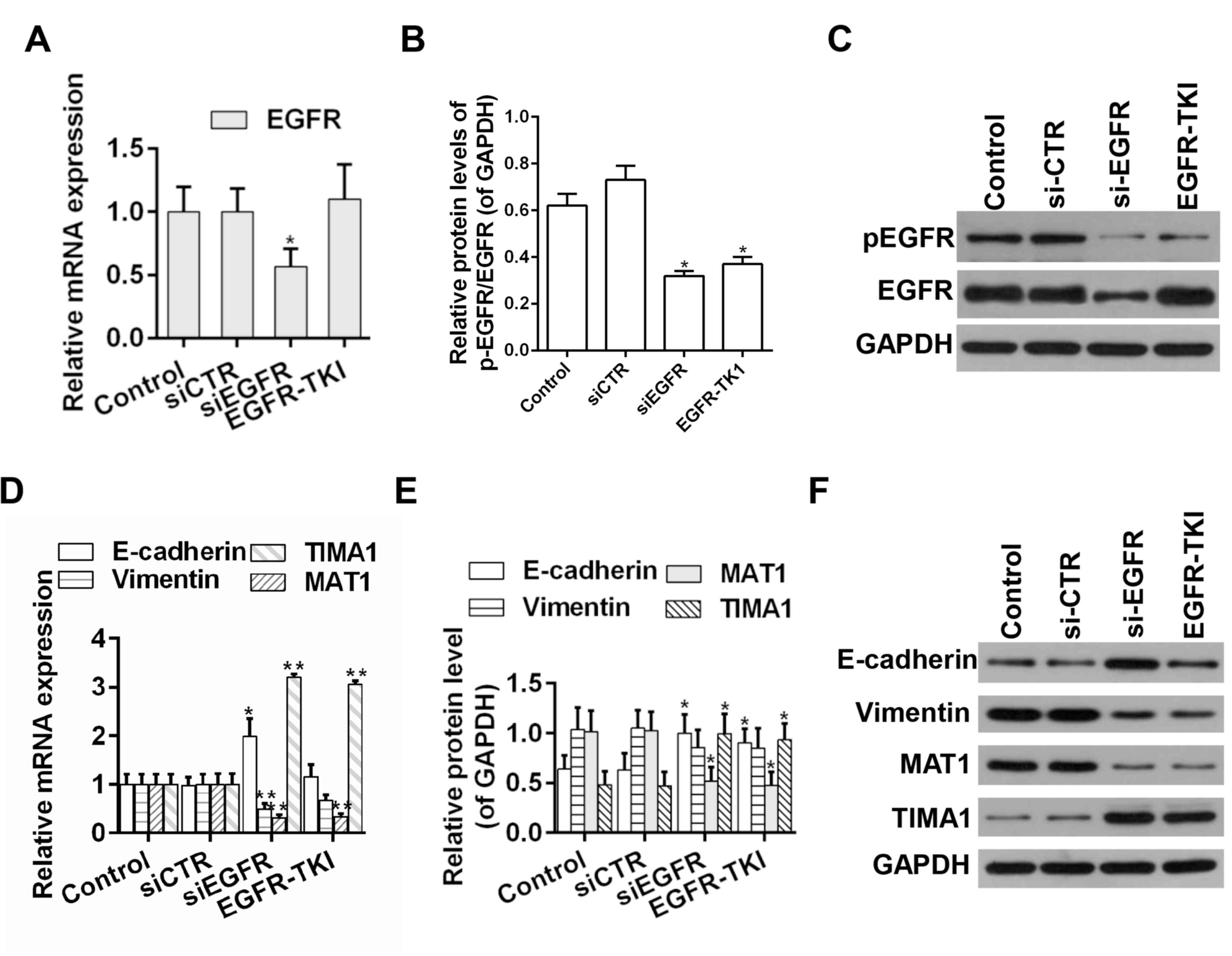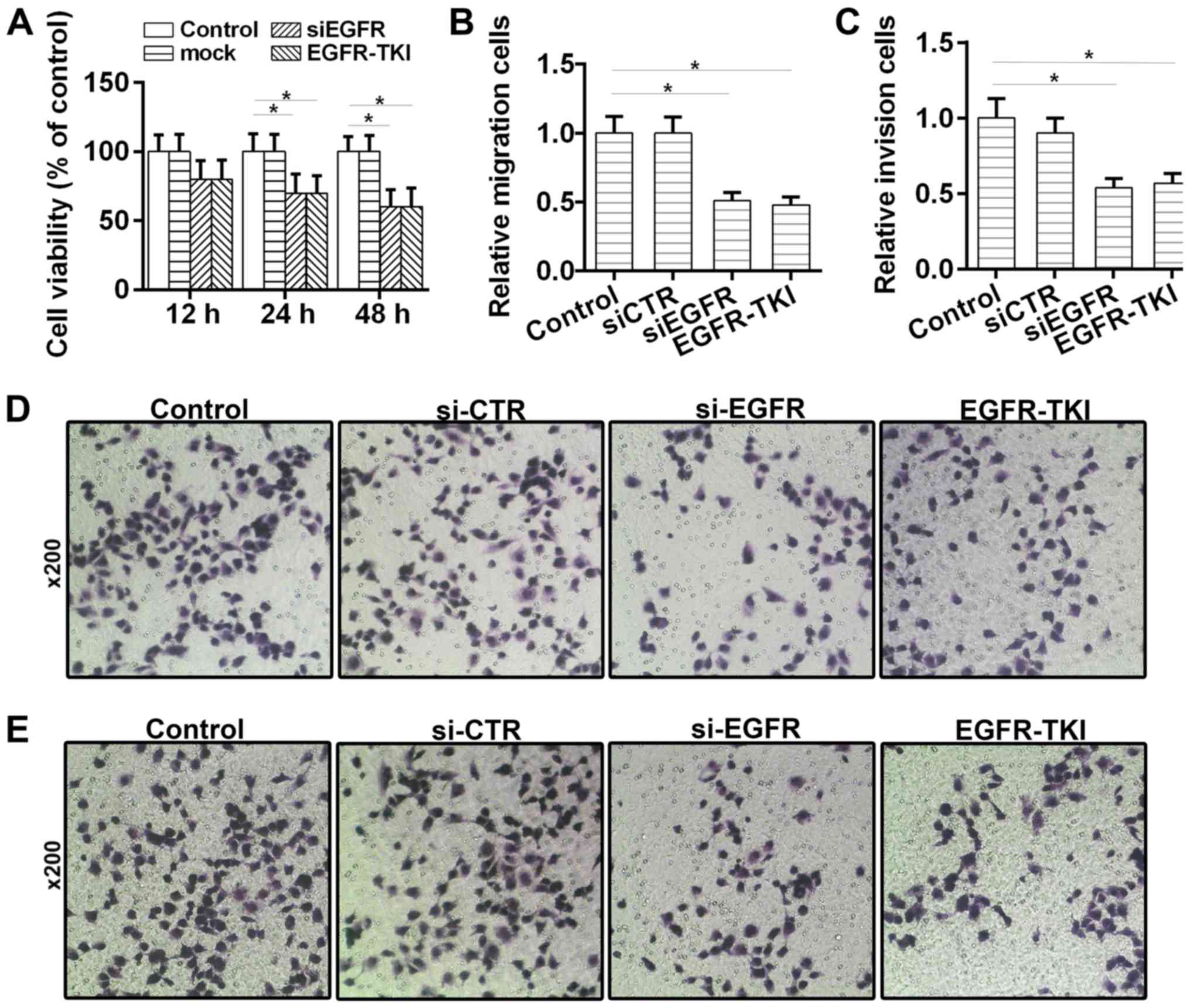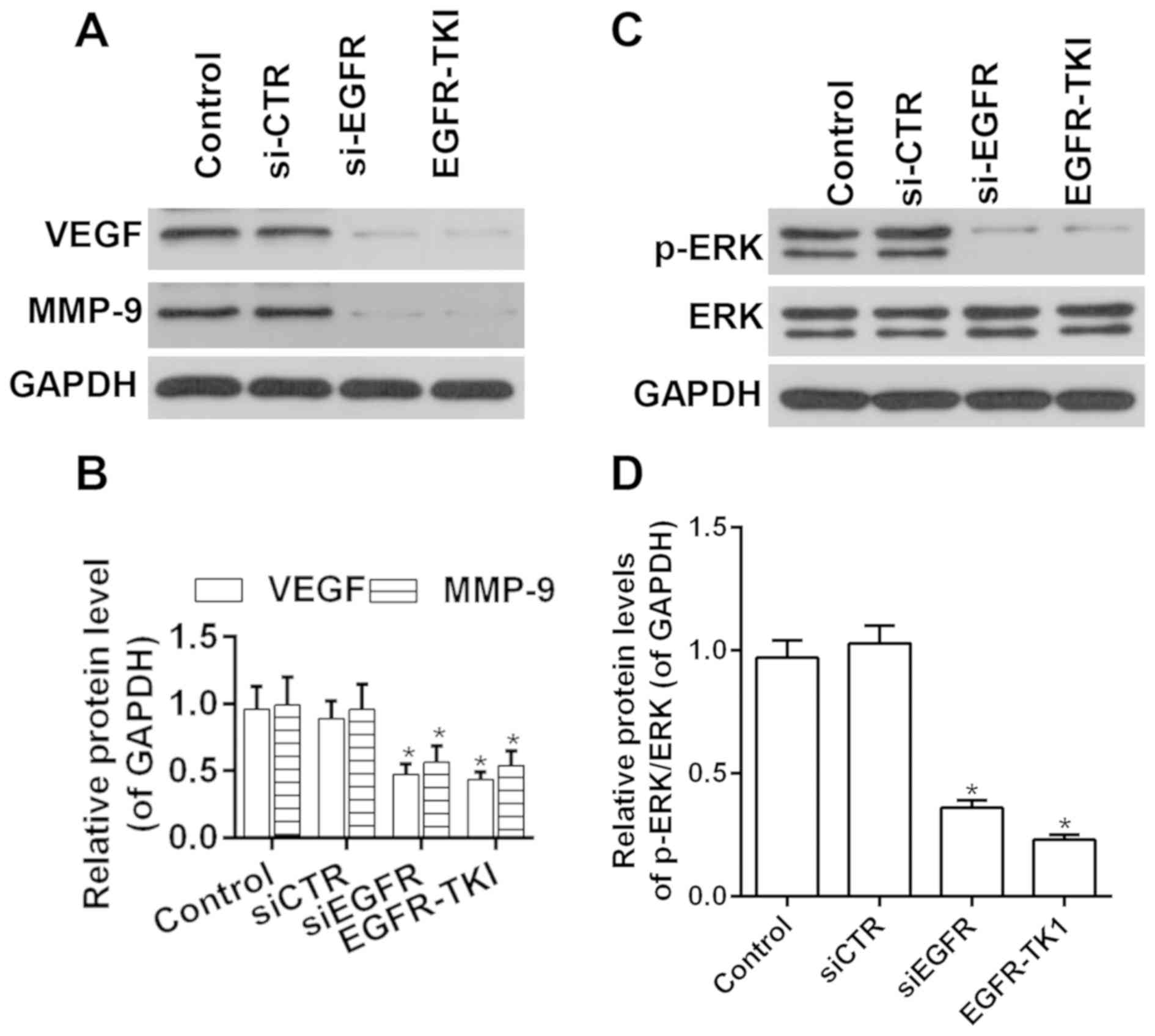|
1
|
Burkhart RA, Ronnekleiv-Kelly SM and
Pawlik TM: Personalized therapy in hepatocellular carcinoma:
Molecular markers of prognosis and therapeutic response. Surg
Oncol. 26:138–145. 2017. View Article : Google Scholar : PubMed/NCBI
|
|
2
|
Torre LA, Bray F, Siegel RL, Ferlay J,
Lortet-Tieulent J and Jemal A: Global cancer statistics, 2012. CA
Cancer J Clin. 65:87–108. 2015. View Article : Google Scholar : PubMed/NCBI
|
|
3
|
Nagao E, Hirakawa M, Soeda H, Tsuruta S,
Sakai H and Honda H: Transcatheter arterial embolization for chest
wall metastasis of hepatocellular carcinoma. World J Radiol.
5:45–48. 2013. View Article : Google Scholar : PubMed/NCBI
|
|
4
|
Wang R, Zhao N, Li S, Fang JH, Chen MX,
Yang J, Jia WH, Yuan Y and Zhuang SM: MicroRNA-195 suppresses
angiogenesis and metastasis of hepatocellular carcinoma by
inhibiting the expression of VEGF, VAV2, and CDC42. Hepatology.
58:642–653. 2013. View Article : Google Scholar : PubMed/NCBI
|
|
5
|
Germano D and Daniele B: TIE2-expressing
monocytes as a diagnostic marker for hepatocellular carcinoma
correlates with angiogenesis. Hepatobiliary Surg Nutr. 3:166–167.
2014.PubMed/NCBI
|
|
6
|
Serrano MJ, Alvarez-Cubero MJ, De Miguel
Pérez D, Rodríguez-Martínez A, Gonzalez-Herrera L, Robles-Fernandez
I, Hernandez JE, Puche JLG and Lorente JA: Significance of EGFR
expression in circulating tumor cells. Adv Exp Med Biol.
994:285–296. 2017. View Article : Google Scholar : PubMed/NCBI
|
|
7
|
Schlessinger J: Ligand-induced,
receptor-mediated dimerization and activation of EGF receptor.
Cell. 110:669–672. 2002. View Article : Google Scholar : PubMed/NCBI
|
|
8
|
Komposch K and Sibilia M: EGFR signaling
in liver diseases. Int J Mol Sci. 17:E302015. View Article : Google Scholar : PubMed/NCBI
|
|
9
|
Zhong L, Liao D, Zhang M, Zeng C, Li X,
Zhang R, Ma H and Kang T: YTHDF2 suppresses cell proliferation and
growth via destabilizing the EGFR mRNA in hepatocellular carcinoma.
Cancer Lett. 442:252–261. 2019. View Article : Google Scholar : PubMed/NCBI
|
|
10
|
Zhu L, Liu R, Zhang W, Qian S and Wang J:
Application of EGFR inhibitor reduces circulating tumor cells
during transcatheter arterial embolization. Clin Transl Oncol.
20:639–646. 2018. View Article : Google Scholar : PubMed/NCBI
|
|
11
|
Keating GM: Afatinib: A review in advanced
non-small cell lung cancer. Target Oncol. 11:825–835. 2016.
View Article : Google Scholar : PubMed/NCBI
|
|
12
|
Rhim AD, Mirek ET, Aiello NM, Maitra A,
Bailey JM, McAllister F, Reichert M, Beatty GL, Rustgi AK,
Vonderheide RH, et al: EMT and dissemination precede pancreatic
tumor formation. Cell. 148:349–361. 2012. View Article : Google Scholar : PubMed/NCBI
|
|
13
|
Li JY, Huang WX, Zhou X, Chen J and Li Z:
Numb inhibits epithelial-mesenchymal transition via
RBP-Jκ-dependent Notch1/PTEN/FAK signaling pathway in tongue
cancer. BMC Cancer. 19:3912019. View Article : Google Scholar : PubMed/NCBI
|
|
14
|
Peng H and Li H: The encouraging role of
long noncoding RNA small nuclear RNA host gene 16 in
epithelial-mesenchymal transition of bladder cancer via directly
acting on miR-17-5p/metalloproteinases 3 axis. Mol Carcinog.
2019.(Epub ahead of print). View
Article : Google Scholar
|
|
15
|
Felipe Lima J, Nofech-Mozes S, Bayani J
and Bartlett JM: EMT in breast carcinoma-a review. J Clin Med.
5:E652016. View Article : Google Scholar : PubMed/NCBI
|
|
16
|
Toh Y, Pencil SD and Nicolson GL: A novel
candidate metastasis-associated gene, mta1, differentially
expressed in highly metastatic mammary adenocarcinoma cell lines.
cDNA cloning, expression, and protein analyses. J Biol Chem.
269:22958–22963. 1994.PubMed/NCBI
|
|
17
|
Toh Y, Pencil SD and Nicolson GL: Analysis
of the complete sequence of the novel metastasis-associated
candidate gene, mta1, differentially expressed in mammary
adenocarcinoma and breast cancer cell lines. Gene. 159:97–104.
1995. View Article : Google Scholar : PubMed/NCBI
|
|
18
|
Minard ME, Kim LS, Price JE and Gallick
GE: The role of the guanine nucleotide exchange factor Tiam1 in
cellular migration, invasion, adhesion and tumor progression.
Breast Cancer Res Treat. 84:21–32. 2004. View Article : Google Scholar : PubMed/NCBI
|
|
19
|
Chen B, Ding Y, Liu F, Ruan J, Guan J,
Huang J, Ye X, Wang S, Zhang G, Zhang X, et al: Tiam1,
overexpressed in most malignancies, is a novel tumor biomarker. Mol
Med Rep. 5:48–53. 2012.PubMed/NCBI
|
|
20
|
Yu LN, Zhang QL, Li X, Hua X, Cui YM,
Zhang NJ, Liao WT and Ding YQ: Tiam1 transgenic mice display
increased tumor invasive and metastatic potential of colorectal
cancer after 1,2-dimethylhydrazine treatment. PLoS One.
8:e730772013. View Article : Google Scholar : PubMed/NCBI
|
|
21
|
Ferrara N, Gerber HP and LeCouter J: The
biology of VEGF and its receptors. Nat Med. 9:669–676. 2003.
View Article : Google Scholar : PubMed/NCBI
|
|
22
|
Kessenbrock K, Plaks V and Werb Z: Matrix
metalloproteinases: Regulators of the tumor microenvironment. Cell.
141:52–67. 2010. View Article : Google Scholar : PubMed/NCBI
|
|
23
|
Stetler-Stevenson WG: Matrix
metalloproteinases in angiogenesis: A moving target for therapeutic
intervention. J Clin Invest. 103:1237–1241. 1999. View Article : Google Scholar : PubMed/NCBI
|
|
24
|
Bourboulia D and Stetler-Stevenson WG:
Matrix metalloproteinases (MMPs) and tissue inhibitors of
metalloproteinases (TIMPs): Positive and negative regulators in
tumor cell adhesion. Semin Cancer Biol. 20:161–168. 2010.
View Article : Google Scholar : PubMed/NCBI
|
|
25
|
Gomes E and Rockwell P: p38 MAPK as a
negative regulator of VEGF/VEGFR2 signaling pathway in serum
deprived human SK-N-SH neuroblastoma cells. Neurosci Lett.
431:95–100. 2008. View Article : Google Scholar : PubMed/NCBI
|
|
26
|
Wang L, Liu T, Nishioka M, Aguirre RL, Win
SS and Okada N: Activation of ERK1/2 and cyclin D1 expression in
oral tongue squamous cell carcinomas: Relationship between
clinicopathological appearances and cell proliferation. Oral Oncol.
42:625–631. 2006. View Article : Google Scholar : PubMed/NCBI
|
|
27
|
Li Q and Yang Z: Expression of
phospho-ERK1/2 and PI3-K in benign and malignant gallbladder
lesions and its clinical and pathological correlations. J Exp Clin
Cancer Res. 28:652009. View Article : Google Scholar : PubMed/NCBI
|
|
28
|
Yang Y, Park H, Yang Y, Kim TS, Bang SI
and Cho D: Enhancement of cell migration by corticotropin-releasing
hormone through ERK1/2 pathway in murine melanoma cell line,
B16F10. Exp Dermatol. 16:22–27. 2007. View Article : Google Scholar : PubMed/NCBI
|
|
29
|
Henry C, Llamosas E, Knipprath-Meszaros A,
Schoetzau A, Obermann E, Fuenfschilling M, Caduff R, Fink D, Hacker
N, Ward R, et al: Targeting the ROR1 and ROR2 receptors in
epithelial ovarian cancer inhibits cell migration and invasion.
Oncotarget. 6:40310–40326. 2015. View Article : Google Scholar : PubMed/NCBI
|
|
30
|
Arocho A, Chen B, Ladanyi M and Pan Q:
Validation of the 2-DeltaDeltaCt calculation as an alternate method
of data analysis for quantitative PCR of BCR-ABL P210 transcripts.
Diagn Mol Pathol. 15:56–61. 2006. View Article : Google Scholar : PubMed/NCBI
|
|
31
|
Jayachandran A, Dhungel B and Steel JC:
Epithelial-to- mesenchymal plasticity of cancer stem cells:
Therapeutic targets in hepatocellular carcinoma. J Hematol Oncol.
9:742016. View Article : Google Scholar : PubMed/NCBI
|
|
32
|
Wang H, Wu Q, Zhang Y, Zhang HN, Wang YB
and Wang W: TGF-β1-induced epithelial-mesenchymal transition in
lung cancer cells involves upregulation of miR-9 and downregulation
of its target, E-cadherin. Cell Mol Biol Lett. 22:222017.
View Article : Google Scholar : PubMed/NCBI
|
|
33
|
Zhu G, Zhang Y, Wang Q, Che S, Yang Y,
Chen L and Lin Z: The prognostic value of Tiam1 correlates with its
roles in epithelial-mesenchymal transition progression and
angiogenesis in lung adenocarcinoma. Cancer Manag Res.
11:1741–1752. 2019. View Article : Google Scholar : PubMed/NCBI
|
|
34
|
Liu CY, Lin HH, Tang MJ and Wang YK:
Vimentin contributes to epithelial-mesenchymal transition cancer
cell mechanics by mediating cytoskeletal organization and focal
adhesion maturation. Oncotarget. 6:15966–15983. 2015.PubMed/NCBI
|
|
35
|
Lin X, Zheng L, Song H, Xiao J, Pan B,
Chen H, Jin X and Yu H: Effects of microRNA-183 on
epithelial-mesenchymal transition, proliferation, migration,
invasion and apoptosis in human pancreatic cancer SW1900 cells by
targeting MTA1. Exp Mol Pathol. 102:522–532. 2017. View Article : Google Scholar : PubMed/NCBI
|
|
36
|
Roskoski R Jr: Small molecule inhibitors
targeting the EGFR/ErbB family of protein-tyrosine kinases in human
cancers. Pharmacol Res. 139:395–411. 2019. View Article : Google Scholar : PubMed/NCBI
|
|
37
|
Ding D, Huang H, Jiang W, Yu W, Zhu H, Liu
J, Saiyin H, Wu J, Huang H, Jiang S and Yu L: Reticulocalbin-2
enhances hepatocellular carcinoma proliferation via modulating the
EGFR-ERK pathway. Oncogene. 36:6691–6700. 2017. View Article : Google Scholar : PubMed/NCBI
|
|
38
|
Ye QH, Zhu WW, Zhang JB, Qin Y, Lu M, Lin
GL, Guo L, Zhang B, Lin ZH, Roessler S, et al: GOLM1 modulates
EGFR/RTK cell-surface recycling to drive hepatocellular carcinoma
metastasis. Cancer Cell. 30:444–458. 2016. View Article : Google Scholar : PubMed/NCBI
|
|
39
|
Scaltriti M and Baselga J: The epidermal
growth factor receptor pathway: A model for targeted therapy. Clin
Cancer Res. 12:5268–5272. 2006. View Article : Google Scholar : PubMed/NCBI
|
|
40
|
Ikeda S, Tsigelny IF, Skjevik ÅA, Kono Y,
Mendler M, Kuo A, Sicklick JK, Heestand G, Banks KC, Talasaz A, et
al: Next-generation sequencing of circulating tumor DNA reveals
frequent alterations in advanced hepatocellular carcinoma.
Oncologist. 23:586–593. 2018. View Article : Google Scholar : PubMed/NCBI
|
|
41
|
Li R, Yanjiao G, Wubin H, Yue W, Jianhua
H, Huachuan Z, Rongjian S and Zhidong L: Secreted GRP78 activates
EGFR-SRC-STAT3 signaling and confers the resistance to sorafeinib
in HCC cells. Oncotargt. 8:19354–19364. 2017.
|
|
42
|
Panvichian R, Tantiwetrueangdet A,
Sornmayura P and Leelaudomlipi S: Missense mutations in exons 18–24
of EGFR in hepatocellular carcinoma tissues. Biomed Res Int.
2015:1718452015. View Article : Google Scholar : PubMed/NCBI
|
|
43
|
Chen BH and Giudice LC: Dysfunctional
uterine bleeding. West J Med. 169:280–284. 1998.PubMed/NCBI
|
|
44
|
Solca F, Dahl G, Zoephel A, Bader G,
Sanderson M, Klein C, Kraemer O, Himmelsbach F, Haaksma E and Adolf
GR: Target binding properties and cellular activity of afatinib
(BIBW 2992), an irreversible ErbB family blocker. J Pharmacol Exp
Ther. 343:342–350. 2012. View Article : Google Scholar : PubMed/NCBI
|
|
45
|
Tu Y, Wang C, Yang Z, Zhao B, Lai L, Yang
Q, Zheng P and Zhu W: Discovery of novel quinazoline derivatives
bearing semicarbazone moiety as potent EGFR kinase inhibitors.
Comput Struct Biotechnol J. 16:462–478. 2018. View Article : Google Scholar : PubMed/NCBI
|
|
46
|
Roof AK and Gutierrez-Hartmann A: Consider
the context: Ras/ERK and PI3K/AKT/mTOR signaling outcomes are
pituitary cell type-specific. Mol Cell Endocrinol. 463:87–96. 2018.
View Article : Google Scholar : PubMed/NCBI
|
|
47
|
Fang ZT, Wang GZ, Zhang W, Qu XD, Liu R,
Qian S, Zhu L, Zhou B and Wang JH: Transcatheter arterial
embolization promotes liver tumor metastasis by increasing the
population of circulating tumor cells. OncoTargets Ther.
6:1563–1572. 2013.
|
|
48
|
Ishiyama N, Lee SH, Liu S, Li GY, Smith
MJ, Reichardt LF and Ikura M: Dynamic and static interactions
between p120 catenin and E-cadherin regulate the stability of
cell-cell adhesion. Cell. 141:117–128. 2010. View Article : Google Scholar : PubMed/NCBI
|
|
49
|
Jiang WG, Grimshaw D, Martin TA, Davies G,
Parr C, Watkins G, Lane J, Abounader R, Laterra J and Mansel RE:
Reduction of stromal fibroblast-induced mammary tumor growth, by
retroviral ribozyme transgenes to hepatocyte growth factor/scatter
factor and its receptor, c-MET. Clin Cancer Res. 9:4274–4281.
2003.PubMed/NCBI
|
|
50
|
Kalluri R and Weinberg RA: The basics of
epithelial-mesenchymal transition. J Clin Invest. 119:1420–1428.
2009. View Article : Google Scholar : PubMed/NCBI
|
|
51
|
Puisieux A: Role of epithelial-mesenchymal
transition in tumor progression. Bull Acad Natl Med. 193:2017–2032;
discussion 2032–2034. 2009.(In French). PubMed/NCBI
|
|
52
|
Wang ZC, Gao Q, Shi JY, Guo WJ, Yang LX,
Liu XY, Liu LZ, Ma LJ, Duan M, Zhao YJ, et al: Protein tyrosine
phosphatase receptor S acts as a metastatic suppressor in
hepatocellular carcinoma by control of epithermal growth factor
receptor-induced epithelial-mesenchymal transition. Hepatology.
62:1201–1214. 2015. View Article : Google Scholar : PubMed/NCBI
|
|
53
|
Deng L, Tang J, Yang H, Cheng C, Lu S,
Jiang R and Sun B: MTA1 modulated by miR-30e contributes to
epithelial-to-mesenchymal transition in hepatocellular carcinoma
through an ErbB2-dependent pathway. Oncogene. 36:3976–3985. 2017.
View Article : Google Scholar : PubMed/NCBI
|
|
54
|
Hashida S, Yamamoto H, Shien K, Miyoshi Y,
Ohtsuka T, Suzawa K, Watanabe M, Maki Y, Soh J, Asano H, et al:
Acquisition of cancer stem cell-like properties in non-small cell
lung cancer with acquired resistance to afatinib. Cancer Sci.
106:1377–1384. 2015. View Article : Google Scholar : PubMed/NCBI
|
|
55
|
Kang X, Lu P, Cui Y, Wang Y, Zhang Q, Gong
Y and Xu Z: Bufalin reverses hepatocyte growth factor-induced
resistance to afatinib in H1975 lung cancer cells. Zhonghua Zhong
Liu Za Zhi. 37:490–496. 2015.(In Chinese). PubMed/NCBI
|
|
56
|
Song L, Li W, Zhang H, Liao W, Dai T, Yu
C, Ding X, Zhang L and Li J: Over-expression of AEG-1 significantly
associates with tumour aggressiveness and poor prognosis in human
non-small cell lung cancer. J Pathol. 219:317–326. 2009. View Article : Google Scholar : PubMed/NCBI
|
|
57
|
Jain RK, Duda DG, Clark JW and Loeffler
JS: Lessons from phase III clinical trials on anti-VEGF therapy for
cancer. Nat Clin Pract Oncol. 3:24–40. 2006. View Article : Google Scholar : PubMed/NCBI
|
|
58
|
Ng EW, Shima DT, Calias P, Cunningham ET
Jr, Guyer DR and Adamis AP: Pegaptanib, a targeted anti-VEGF
aptamer for ocular vascular disease. Nat Rev Drug Discov.
5:123–132. 2006. View Article : Google Scholar : PubMed/NCBI
|
|
59
|
Mukhopadhyay D, Nagy JA, Manseau EJ and
Dvorak HF: Vascular permeability factor/vascular endothelial growth
factor-mediated signaling in mouse mesentery vascular endothelium.
Cancer Res. 58:1278–1284. 1998.PubMed/NCBI
|
|
60
|
Zhang HH, Zhang Y, Cheng YN, Gong FL, Cao
ZQ, Yu LG and Guo XL: Metformin incombination with curcumin
inhibits the growth, metastasis, and angiogenesis of hepatocellular
carcinoma in vitro and in vivo. Mol Carcinog. 57:44–56. 2018.
View Article : Google Scholar : PubMed/NCBI
|
|
61
|
Brown DM and Regillo CD: Anti-VEGF agents
in the treatment of neovascular age-related macular degeneration:
Applying clinical trial results to the treatment of everyday
patients. Am J Ophthalmol. 144:627–637. 2007. View Article : Google Scholar : PubMed/NCBI
|
|
62
|
Huang M, Huang B, Li G and Zeng S:
Apatinib affect VEGF-mediated cell proliferation, migration,
invasion via blocking VEGFR2/RAF/MEK/ERK and PI3K/AKT pathways in
cholangiocarcinoma cell. BMC Gastroenterol. 18:1692018. View Article : Google Scholar : PubMed/NCBI
|
|
63
|
Fearnley GW, Smith GA, Abdul-Zani I,
Yuldasheva N, Mughal NA, Homer-Vanniasinkam S, Kearney MT, Zachary
IC, Tomlinson DC, Harrison MA, et al: VEGF-A isoforms program
differential VEGFR2 signal transduction, trafficking and
proteolysis. Biol Open. 5:571–583. 2016. View Article : Google Scholar : PubMed/NCBI
|
|
64
|
Almalki SG and Agrawal DK: ERK signaling
is required for VEGF-A/VEGFR2-induced differentiation of porcine
adipose-derived mesenchymal stem cells into endothelial cells. Stem
Cell Res Ther. 8:1132017. View Article : Google Scholar : PubMed/NCBI
|
|
65
|
Mu X, Zhao T, Xu C, Shi W, Geng B, Shen J,
Zhang C, Pan J, Yang J, Hu S, et al: Oncometabolite succinate
promotes angiogenesis by upregulating VEGF expression through
GPR91-mediated STAT3 and ERK activation. Oncotarget. 8:13174–13185.
2017. View Article : Google Scholar : PubMed/NCBI
|


















